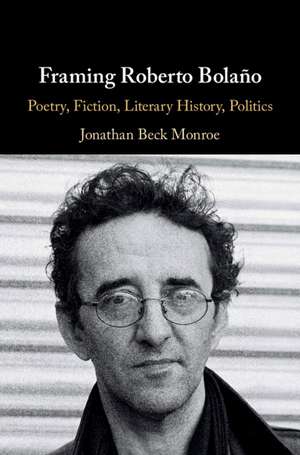Framing Roberto Bolaño: Poetry, Fiction, Literary History, Politics
Autor Jonathan Beck Monroeen Limba Engleză Paperback – 18 aug 2021
| Toate formatele și edițiile | Preț | Express |
|---|---|---|
| Paperback (1) | 285.37 lei 43-57 zile | |
| Cambridge University Press – 18 aug 2021 | 285.37 lei 43-57 zile | |
| Hardback (1) | 693.36 lei 43-57 zile | |
| Cambridge University Press – 2 oct 2019 | 693.36 lei 43-57 zile |
Preț: 285.37 lei
Nou
Puncte Express: 428
Preț estimativ în valută:
54.61€ • 56.67$ • 45.65£
54.61€ • 56.67$ • 45.65£
Carte tipărită la comandă
Livrare economică 17-31 martie
Preluare comenzi: 021 569.72.76
Specificații
ISBN-13: 9781108735568
ISBN-10: 1108735568
Pagini: 265
Dimensiuni: 152 x 228 x 17 mm
Greutate: 0.4 kg
Editura: Cambridge University Press
Colecția Cambridge University Press
Locul publicării:Cambridge, United Kingdom
ISBN-10: 1108735568
Pagini: 265
Dimensiuni: 152 x 228 x 17 mm
Greutate: 0.4 kg
Editura: Cambridge University Press
Colecția Cambridge University Press
Locul publicării:Cambridge, United Kingdom
Cuprins
Introduction: unpacking Bolaño's library; Part I: 1. 'Undisciplined writing' Antwerp (Amberes); 2. Poetry as symptom and cure Monsieur Pain; 3. The novel's regimes made visible in the Third Reich (El Tercer Reich); Part II: 4. Poetry at the ends of its lines the unknown university (La universidad desconocida) Nazi literature in the Americas (La literatura nazi en América); 5. Post-avant histories distant star (Estrella distante); Part III: 6. Dismantling narrative drive the savage detectives (Los detectives salvajes); 7. Making visible the 'non-power' of poetry Amulet (Amuleto); 8. Poetry, politics, critique by night in Chile (Nocturno de Chile); Part IV: 9. Literary taxonomies after the wall woes of the true policeman (Los sinsabores del verdadero policía); 10. 'What a relief to give up literature' 2666; Conclusion: from the known to the unknown university.
Recenzii
'Jonathan Monroe’s excellent monograph offers an original take that combines the best of close reading with theoretical reflection. The author explores Bolaño’s broad-ranging literary culture with great success. He offers a detailed portrait not just of a writer, but of a reader. This is, in short, a significant contribution that will appeal to anyone who wants to understand the whole of Bolaño’s oeuvre.' Héctor Hoyos, Stanford University, California
'Eye-opening and unique, Framing Roberto Bolaño is a brilliant, comparative study of literary genres through the analysis of Bolaño’s oeuvre. Tracing the evolution of Bolaño’s writing from the minimal (the anti-narrative prose poems in Antwerp) to the maximal (the monumental 2666), it contextualizes Bolaño’s understanding of western literary history and politics, as well as his attitude toward readers and critics. Monroe’s erudite familiarity with American and European as well as Latin American literature facilitates the insightful identification of important literary influences, leitmotifs, and themes in Bolaño’s works. Revealing Bolaño’s itinerary as a voracious reader, the book contextualizes his literature, and, along the way, defends its canonicity and importance in the World’s Republic of Letters. An amazing research effort, with many innovative and original insights into a literature that seemed to have reached its limits for future literary analysis, it will be of interest to students and professors in Latin American and Western literature.' Ignacio Lópoez-Calvo, University of California, Merced
'Eye-opening and unique, Framing Roberto Bolaño is a brilliant, comparative study of literary genres through the analysis of Bolaño’s oeuvre. Tracing the evolution of Bolaño’s writing from the minimal (the anti-narrative prose poems in Antwerp) to the maximal (the monumental 2666), it contextualizes Bolaño’s understanding of western literary history and politics, as well as his attitude toward readers and critics. Monroe’s erudite familiarity with American and European as well as Latin American literature facilitates the insightful identification of important literary influences, leitmotifs, and themes in Bolaño’s works. Revealing Bolaño’s itinerary as a voracious reader, the book contextualizes his literature, and, along the way, defends its canonicity and importance in the World’s Republic of Letters. An amazing research effort, with many innovative and original insights into a literature that seemed to have reached its limits for future literary analysis, it will be of interest to students and professors in Latin American and Western literature.' Ignacio Lópoez-Calvo, University of California, Merced
Notă biografică
Descriere
Traces the development of Roberto Bolaño's work from the beginning to the end of his career.
